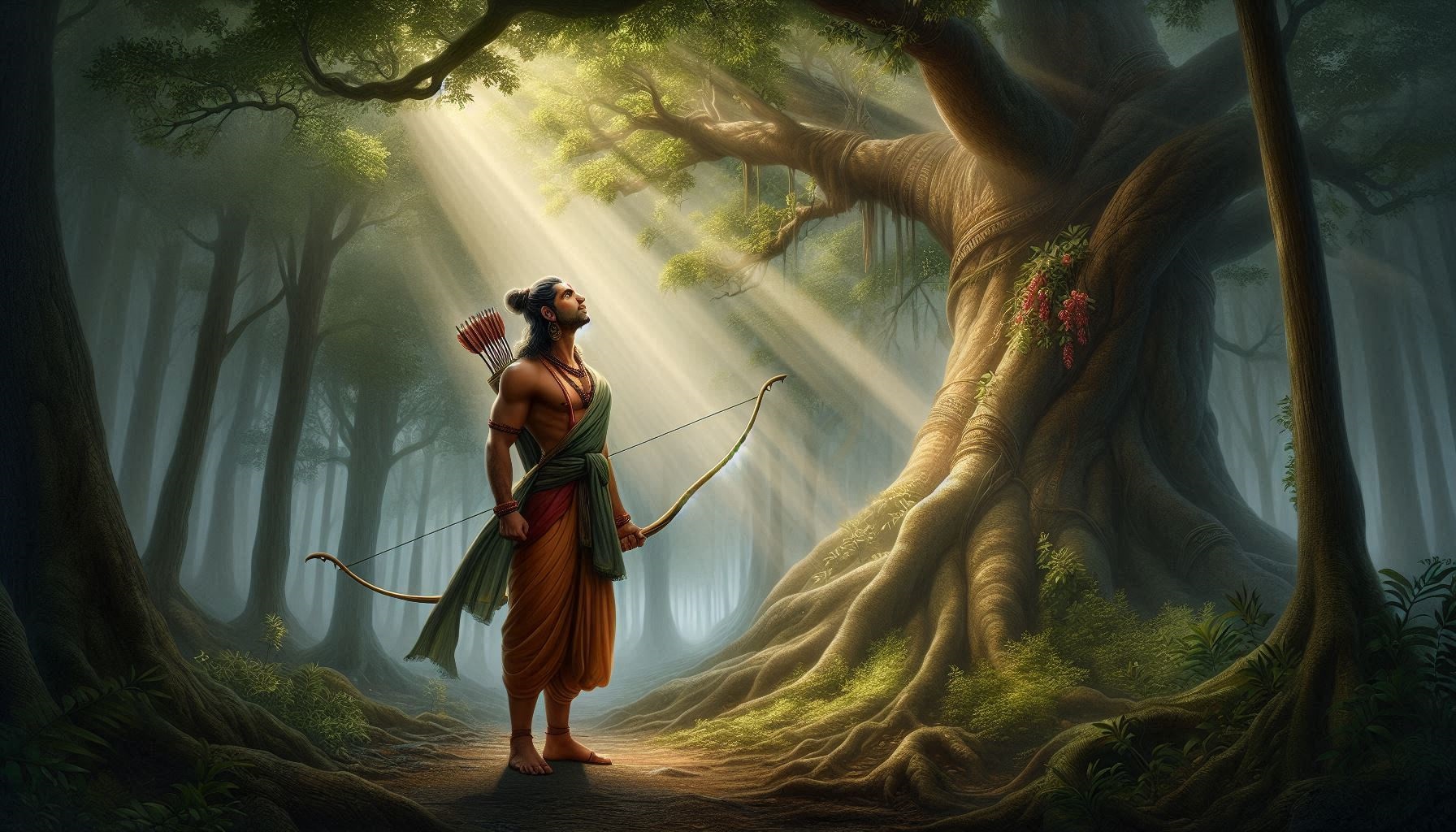The twelfth year of exile for the Pandavas was nearly over, and the final year of incognito lay just ahead. Each of the Pandavas trained diligently, their hearts restless yet driven by the singular goal of reclaiming their lost kingdom. But for Arjun, the famed archer and son of Indra, this exile held a deeper agony. His Gandiv bow and his divine weapons were no longer his to hold, hidden under the Shami tree as a safeguard against potential curses.
As days passed, Arjun often found himself sitting alone by the Shami tree, its ancient branches swaying gently above him. It was under this very tree that his weapons rested, safely concealed but ever reminding him of his duty and purpose. A warrior, separated from his tools, forced to rely solely on his discipline and will — this was the test he faced.
A Moment of Reflection Under the Shami Tree

One evening, as Dusshera, the day of Vijayadashami, approached, Arjun meditated in silence by the tree. He closed his eyes, recalling memories of the battlefield, the thrill of victory, and the times when Gandiv had been an extension of his very soul. Suddenly, a voice echoed within him, bringing him a message from the depths of his spirit: “Arjun, the power you seek lies within you, not in the bow.”
This moment was a turning point. He began to see his exile not as a punishment but as a journey toward inner mastery. For twelve years, he had practiced patience, restraint, and discipline. He understood that the true strength of a warrior was not his weapon but his unwavering spirit and clarity of purpose.
The Sacred Return of Gandiv on Vijayadashami
The day of Dusshera arrived, and it was time to reclaim his weapons. As he approached the Shami tree, he saw Gandiv glinting in the dappled sunlight, hanging from the branches as though waiting for him. Arjun felt a profound sense of gratitude and reverence. This was no ordinary retrieval; it was a symbolic moment where he was reclaiming not only his weapons but his commitment to justice, duty, and honor.
With a deep bow, Arjun offered his respects to the Shami tree, understanding it had been both a guardian and a witness to his transformation. In that sacred act, he renewed his vow to uphold righteousness and fight for dharma.
Significance of the Shami Tree and Vijayadashami
The Shami tree, which safeguarded Gandiva, symbolizes resilience, faith, and protection. In Indian culture, the Shami tree holds a special place, and it is revered during Dusshera. In many regions, people worship the tree on this day, exchange its leaves as tokens of goodwill, and remember Arjun’s journey as a metaphor for their own challenges and victories.
Arjun’s act of reclaiming his bow on Vijayadashami resonates with the core themes of the festival: victory of good over evil, mastery of self, and the strength that lies within. Just as the Shami tree protected Gandiva, the festival reminds us of the silent strength that can guide us through our toughest trials.
Arjun’s Legacy and the Message of Vijayadashami
The tale of Arjun retrieving Gandiv on Vijayadashami leaves a legacy of courage and self-discovery. For generations, this story has reminded people that true power comes from within and that each of us has an inner strength waiting to be awakened. Dusshera, with its celebrations of victory, fire, and light, is more than a commemoration of good triumphing over evil; it is a call to find our own inner resilience.
In today’s world, as in Arjun’s time, we are all challenged by battles — some external, others within our own minds. Dusshera reminds us that, like Arjun, we must confront these battles with resolve, patience, and clarity. Each victory, whether large or small, brings us closer to our true potential.
Relevance of the Story for Vijayadashami
Arjun’s story is a timeless reminder of the spirit of Dusshera. It is not only a tale of victory but also a journey of self-mastery. Just as Arjun found his strength beneath the Shami tree, the festival encourages everyone to reflect, refine, and rise above their inner and outer challenges. Vijayadashami symbolizes the reclaiming of one’s purpose and strength, a fitting parallel to Arjun’s experience under the Shami tree.

